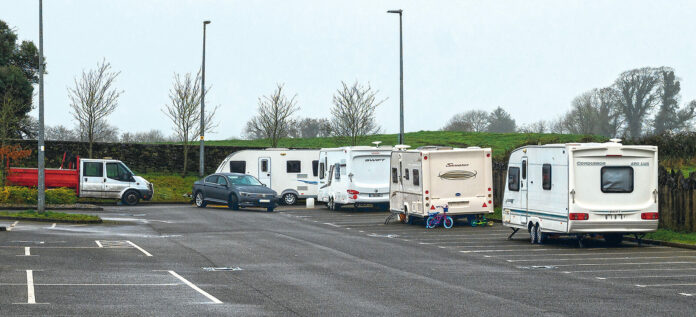A RECOMMENDATION contained in a Traveller accommodation expert review report repealing trespass legislation would make it almost impossible to move on illegal encampments in Clare.
That’s according to Deputy Cathal Crowe, who has described this proposal as “crazy and political correctness gone mad”.
The Meelick Deputy has also expressed concern about the colossal legal fees faced by local authorities in defending themselves in court on matters relating to Traveller accommodation.
In 2021, Clare County Council spent €1.1 million defending legal actions taken against it by various individuals and bodies.
“It is a waste of public money that would be much better spent in providing accommodation, rather than lining the pockets of lawyers,” he said.
Speaking in the Dáil recently, Deputy Crowe cited one of the recommendations contained in the report, which was published in July 2019, proposing to “repeal the Trespass legislation, in particular as it applies to publicly owned land, until an appropriate network of transient provision as envisaged in the 1998 Act has been provided”.
“If this came to pass, we could potentially have encampments in hospital car parks, school yards, public parks and the list goes on. These examples are not hysterical or outlandish and there are many examples – too many – of illegal encampments on public property now. This proposal would, of course, serve to make them legal and make it impossible to move on illegal encampments.”
“There is an encampment at Sixmilebridge Railway Station. The approach in this instance seems to be ‘Here we are, we have rocked up, house us’. This is an illegal takeover of a public facility and, moreover, it amounts to leapfrogging of the housing waiting list, which is very unfair to other Traveller families and members of the settled community who have waited years to be housed.
“What is the current status of the recommendation I referred to? The answer to Traveller accommodation provision surely relates to the provision of transient sites and permanent accommodation and not tearing apart age-old trespassing laws.”
Stating Clare County Council more than meets its legal obligations in providing Traveller accommodation, he said, very often, disputes arise because of irreconcilable differences between housing needs versus housing wants.
“If a local authority has offered suitable accommodation to a Traveller family, it should not be hauled before the courts. The Minister of State has a moral duty to protect local authorities
from these actions.
“We must provide suitable accommodation, both permanent and transient, for Traveller families, and we have a moral and legal obligation to do so. When it comes to dismantling trespassing laws or expending fortunes on legal actions, we also need to have a good look at ourselves.”
Minister of State for Local Government and Planning, Peter Burke outlined the trespass recommendation of the expert report is currently with the programme board.
Minster Burke said that department has to liaise with the Department of Justice on the eviction notices and the 24 hours. Putting a cap, stall or moratorium on such evictions was one of the legislative provisions the Dáil voted on in emergency time, which happened.
The Traveller accommodation expert group was established by my Department in 2018 to review the Housing (Traveller Accommodation) Act 1998 and other legislation impacting on the provision and delivery of accommodation for Travellers.
The report from the expert group sets out an integrated set of recommendations intended to improve the effectiveness of the arrangements for providing accommodation for members of the Traveller community.
These recommendations address four key themes: delivery reflecting need, planning, capacity and resources and governance.
Earlier this year, Minister Burke established a programme board to oversee implementation of recommendations from the expert group.
The programme board includes two Traveller representatives, the County and City Management Association, CCMA, representatives and two representatives from my Department.
It is chaired by the chair of the National Traveller Accommodation Consultative Committee, NTACC.
The programme board has put in place a programme of work for 2021, which covers 18 of the 32 recommendations. These are being worked on by department officials with the help and support of various other stakeholders.
Other recommendations currently being worked upon include: social housing assessment regulations, transfer policy from HAP-RAS to Traveller-specific accommodation, use of local authority emergency powers, the Part 8 planning consent process for local authority-own developments and trespass legislation.
Meanwhile, the recent Supreme Court ruling on a Traveller accommodation case involving Clare County Council was also mentioned at the end of a briefing with local Oireachtas members.
It is understood this case will be returned to the High Court to deal with the substantive issue at the centre of proceedings.
By Dan Danaher


